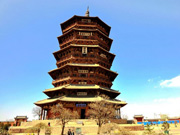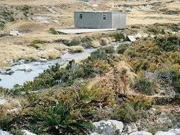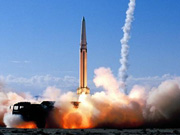


Chinese President Xi Jinping (R) meets with Saudi Arabia Crown Prince Salman Bin Abdulaziz Al Saud, who is also the deputy premier and minister of defense, in Beijing, capital of China, March 13, 2014. [File Photo: Xinhua/Pang Xinglei]
President Xi Jinping will kick start the year 2016 with his first state visits to three countries in the Middle East. This visit will also be his first state visit to the region after taking office. The last such visit made by a Chinese President to Saudi Arabia was back in 2009 when President Hu Jintao visited the country and the last state visit made to Iran was back in 2002 when President Jiang Zemin visited Iran. The Ministry of Foreign Affairs of the Peoples Republic of China formally announced this visit last Friday. The visit starts from Tuesday to Saturday in which the President is scheduled to visit Saudi Arabia first upon the invitation of King Salman bin Abdulaziz followed by a visit to Egypt and then Iran.
Under President Xi's leadership China has certainly made its mark in promoting world peace. Last year USA and its allies were able to conclude the landmark nuclear deal with Tehran only because of China's aid. China has also been playing a major role in negotiations to find peaceful resolutions for the unrest in Afghanistan. Beijing has also been busy trying the promote peace between the Syrian government and the opposition. The Middle East visit holds tremendous significance not only for China but for the rest of the world as President Xi will be wearing his diplomatic hat to conjure all his diplomatic skills to diffuse the brewing tensions between Riyadh and Tehran. This region is not only important because it houses the largest Muslim population of both sects (Shia & Sunni) but it is also the largest oil producing region of the world where the daily oil production of Saudi Arabia is 11,730,000 Billion Barrels per Day and Iran's Yield is around 3,594,000 Billion Barrels per Day. Just imagine what repercussions the world might face if tensions between these two countries escalate any further.
President Xi's visit to the Middle East this year marks the 60th anniversary of China-Arab diplomatic relations, and to highlight the importance of this region. China also issued its first "Arab Policy Paper." This policy document outlines a great win-win formula to promote trade and strengthen relations between Arab countries and China. The formula is "1 plus 2 plus 3" which is built upon the framework of the "One Belt & One Road" initiative and this formula highlights three core areas from which the platform of relations can be launched to newer highs. "1" is the heart of the relationship which deals with "energy cooperation". "2" encompasses the investments in infrastructure which will facilitate "1" and "3" refers to three new avenues of cooperation ranging from nuclear energy, clean energy and aerospace. President Xi will also be visiting Egypt which houses the headquarters of the League of Arab States which might be considered by some as an ineffective platform but it is expected that with President Xi's Charisma and with China's peaceful firepower which comprises of economic interests, goodwill and cooperation dynamics; he can jump start the engines of this institution to bring peace in the region.
The reason why China has been able to successfully broker peace deals in the recent past is because of President Xi's vision of promoting global trade and by creating a win-win environment from which no one wants to leave the table. Middle East region and Afghanistan have been termed as the graveyards of super powers by various International Relations experts and that is why some analysts believe China might run into trouble by trying to meddle in the affairs of the Middle East where the dynamics of the problems are very complex. The truth of the matter is that that, meddling in affairs has never been China's stance and many global powers have used their military power, hegemonic designs, and other interventionist policies or have used the carrot and stick approach where the carrot never truly materialized for the people. These very policies have been the reason why other countries have failed in the past.
By examining China-Arab trade figures we can see that in just the first nine months of last year trade reached $155.3 billion, and China's oil imports reached 110 million tons of crude oil, this trade has appreciated as compared to the previous year and the growth is 4.6 %. This is why the "Arab Policy Paper" promises to complete negotiations on a free trade agreement with the Gulf Cooperation Council. The paper also highlights the enhancement of Chinese non-oil imports from Arab countries. There are plans for long-term security cooperation, including joint exercises, intelligence sharing, training and technical cooperation. The Paper also endorses people to people exchanges. These are the tools through which President Xi will be able to defuse tensions in the Middle East and with this the "Belt and Road" initiative will come closer to its realization and will burn the flames of friendship between the two regions brighter; which dates back to ancient times. Over two thousand years, when land and maritime Silk Roads already linked the Chinese and Arab nations. To conclude I will use an excerpt from the Arab Policy Paper issued by the Ministry of Foreign Affairs of China.
"In the long stretches of history, peace and cooperation, openness and inclusiveness, learning from each other, mutual benefit and win-win results have always been the main theme of exchanges between China and Arab countries."
Day|Week

 SWAT members hold romantic wedding in E China
SWAT members hold romantic wedding in E China Breathtaking scenery and simple lifestyle in Hainan
Breathtaking scenery and simple lifestyle in Hainan Finding sexiest underwear supermodels
Finding sexiest underwear supermodels Top 10 ancient pagodas in China
Top 10 ancient pagodas in China Chinese version of Victoria's Secret Show held in Hunan
Chinese version of Victoria's Secret Show held in Hunan Can you find out the sniper hiding in camouflage?
Can you find out the sniper hiding in camouflage? Spectacular rockets launch scenes
Spectacular rockets launch scenes Spectacular aerial photos of the Three Gorges
Spectacular aerial photos of the Three Gorges Admit it! That is a High-way built by China
Admit it! That is a High-way built by China Photos of Beijing Film Academy student hit the Internet
Photos of Beijing Film Academy student hit the Internet